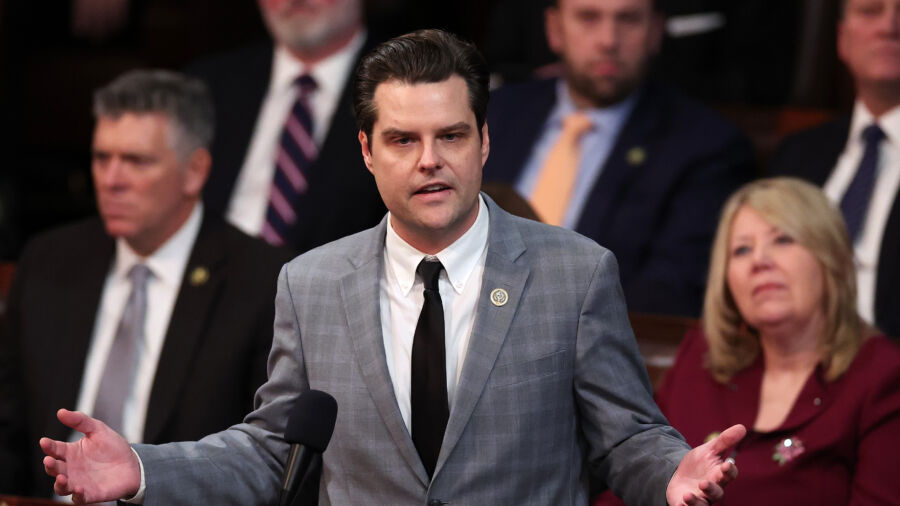Representative Matt Gaetz (R-Fla.) is shooting down suggestions of a rift within the body of House Republicans that could lead to House Speaker Kevin McCarthy (R-Calif.) losing control of the gavel over his debt ceiling negotiations.
In an interview with the Washington Examiner on Monday, Gaetz said he has “no plans” to unseat McCarthy. While Gaetz had initially opposed McCarthy’s speakership bid and his proposal to increase the debt limit, Gaetz said that he doesn’t see a reason to find a new House speaker unless there’s some “dramatic, unexpected turn” in McCarthy’s debt limit negotiations with President Joe Biden.
“You don’t remove someone simply because you disagree with them. By that standard, no speaker would last a single day. Speaker McCarthy simply must deliver on the promises he made in January,” Gaetz said. “So far, his record doing so is admirable. So far.”
Last month, McCarthy led House Republicans in passing the Limit, Save, Grow Act of 2023 (pdf). The bill would prevent the United States from defaulting on its debts by increasing the debt limit by up to $1.5 trillion through March 31, 2024, while at the same time imposing spending reforms that would slow the current U.S. debt trajectory by $4.5 trillion over a decade.
The bill would specifically set annual discretionary spending at Fiscal Year 2022 levels and would regulate discretionary spending growth to 1 percent annually over the next decade. It would also rescind any unspent pandemic-era relief funds, prohibit executive actions Biden has taken to cancel student loans, and impose work requirements for some recipients of Medicaid and Supplemental Nutritional Assistance Program (SNAP).
While the current Limit, Save, Grow Act is unlikely to pass in the Democrat-controlled Senate, McCarthy is using the bill as a baseline for negotiating with the Biden administration, which has called for a “clean bill” to increase the debt limit without any additional conditions on spending.
Gaetz said he did not oppose the Republican Limit, Save, Grow Act because he would prefer a “clean” debt limit increase, but rather because he has “consistently voted against raising the debt ceiling” in the past.
“While I applaud the work of my Republican colleagues to demand better energy policy, regulatory reform, welfare-to-work requirements and less spending, a troubling fact remains: This plan will increase America’s debt by $16 trillion over the next ten years,” Gaetz said last month.
Where Negotiations Stand
The negotiations are key as the United States is at its current $31.4 trillion debt limit and could default on a debt payment by June 1.
McCarthy faced questions about potential scenarios that may play out as the U.S. draws closer to a default on a debt payment. One reporter asked if there is any scenario where McCarthy would agree to a so-called “clean” debt limit increase. McCarthy replied that “we’re never putting a clean debt ceiling on the floor” and said the Senate could simply pass the Republican House bill if time runs out to avoid a debt default.
“We’ve passed the bill. We have the ability to do this. You don’t have to worry because we have a bill over on the Senate side that they can pass that raises the debt ceiling,” McCarthy said. “We can get this job done now.”
Negotiations between McCarthy and Biden are ongoing. On Monday, both sides described a “productive” meeting but said they still haven’t worked out a deal.
While the Republican side is seeking new controls on discretionary spending, work requirements for welfare programs and a clawing back of pandemic-era spending, McCarthy said only two issues are non-negotiable: an unconditional debt limit increase and a tax increase.
“From the first day I sat with the President, there have been two criteria. I told him we’re not going to raise taxes because we bring in more money than we ever have. And we’re not going to pass a clean debt ceiling,” McCarthy said. “Everything else is open for negotiations.”
Republican Mutiny?
Several news media outlets have reported the possibility that some of the most conservative House Republicans could seek to remove McCarthy if he offers a debt limit deal that’s too lenient to Biden and the Democrats. In January, as McCarthy was negotiating with members of his own party to support his speakership bid, he agreed to a rule that makes it easier to make a “motion to vacate” which would set up a vote to oust McCarthy from the speakership.
On May 16, Politico reported that a bloc of House Democrats had already formed and offered to back McCarthy if he offered debt limit concessions that would put him at odds with some staunch conservatives.
On May 18, the staunchly conservative House Freedom Caucus called on McCarthy to halt debt limit negotiations until the Senate passes the Limit, Save, Grow Act.
“House Republicans did our job on debt ceiling. It’s time for President Biden and Senate Democrats to do theirs and pass the Limit, Save, Grow Act,” the caucus wrote on Twitter. “No more discussion on watering it down. Period.”
The House Freedom Caucus statement did not reference invoking the “motion to vacate” to remove McCarthy if he were to water down the bill too much.
Following his interview with the Washington Examiner, Gaetz suggested this talk of removing McCarthy may be more of a media construct than a legitimate issue.
“Literally nobody except the press is talking about removing McCarthy right now,” he wrote on Twitter.
Rep. Bob Good (R-Va.), a member of the House Freedom Caucus, also pushed back on talk of removing McCarthy over a debt limit compromise.
“Nobody’s talking about that. We support our Speaker. We want him to be successful because the country needs for him to be successful. We’re united in the plan that we put forward,” Good told MSNBC’s Andrea Mitchell on May 17.

